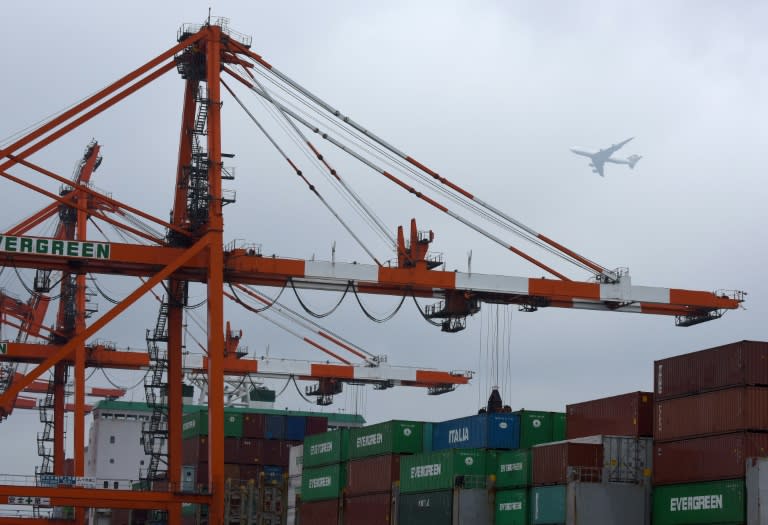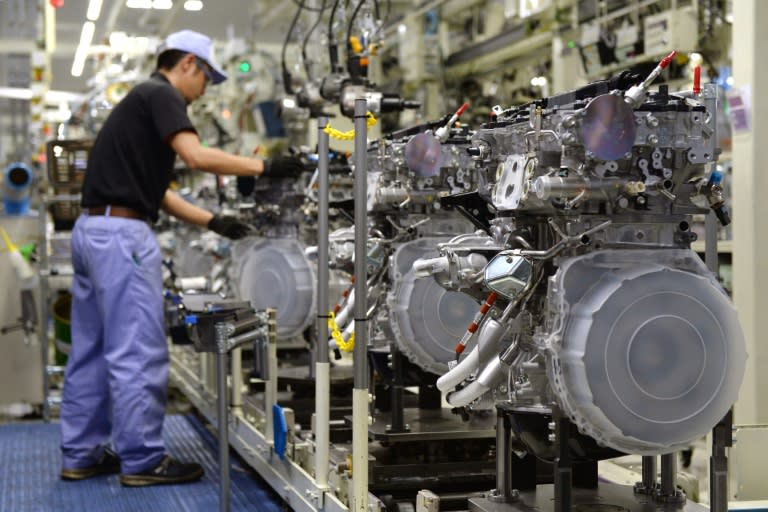IMF trims Japan growth forecasts for 2015, next year
Japan's economy will expand at a slower rate than previously forecast this year and next, the International Monetary Fund warned Tuesday, in another blow to Prime Minister Shinzo Abe's stuttering growth blitz. The Washington-based IMF also called on authorities to work harder on slashing the country's giant national debt, which is more than twice as big as its gross domestic product (GDP). The projections come amid fears about a sharp slowdown in the Chinese economy -- the world's second biggest and a key driver of global growth -- which has sent shudders around the planet. The IMF estimated in its semi-annual World Economic Outlook that Japanese growth this year would hit 0.6 percent, followed by 1.0 percent expansion in 2016. That compares with projections earlier this year for 0.8 percent and 1.2 percent respectively. "The gradual pickup reflects support from higher compensation and higher equity prices due to the Bank of Japan's additional quantitative and qualitative easing, as well as lower oil and commodity prices," the report said. Abe unveiled a plan in April 2013 to kickstart the economy and bring an end to painful deflation with a vast government spending programme and Bank of Japan asset-buying programme -- or quantitative easing -- dubbed "Abenomics". While the scheme showed early promise, with stocks surging and growth advancing, a recent run of weak data has raised questions about its effectiveness as consumer prices stagnate and economic growth remains torpid. The BoJ will conclude a two-day policy meeting Wednesday that markets will be watching to see if it unveils fresh measures. Another meeting is pencilled in for October 30. But the IMF said a recovery in Japan was more tentative than in other advanced economies and repeated calls to rein in its debt pile by constraining spending and raising revenue. "Japan should aim to put debt on a downward path, based on realistic economic assumptions, and specific structural revenue and expenditure measures should be identified up front," it said. However, a sales tax hike last year -- aimed at paying down some of the debt -- hammered consumer spending and helped send the country into recession. The impact of that rise played a key part in Abe delaying a second increase until 2017. The IMF also recommended Tokyo usher in more reforms to the highly regulated economy, in particular encouraging greater participation among those sectors of the community traditionally left out of the workforce. "In Japan, removing tax disincentives and raising the availability of childcare facilities through deregulation would help to boost female labor force participation further," it said. "Increasing reliance on foreign labor and providing incentives for older workers to remain in the workforce should also help in avoiding declines in trend employment." Japan's deflation-plagued economy had been on a roll since Abe swept to power in late 2012 and unleashed his stimulus and spending drive. However, the report said there had been a lack of urgency in implementing riskier structural reforms, referred to as the "third arrow" in Abe's growth plan. "More forceful structural reforms should be the priority," the Fund said.



